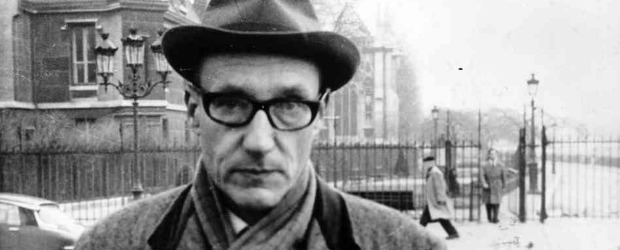You have no items in your cart. Want to get some nice things?
Go shopping
For some reason the writer is often drawn to the expatriate life. Perhaps it is simply due to the fact that writers have done it in the past that others view it as a decidedly literary way to live. Sometimes it involves traveling to places where other writers have found success – as in the case of Paris, which finds itself as a sort of point of pilgrimage for aspiring Hemingways, Fitzgeralds, and Steins – and sometimes it is a matter of pure escape.
In the twentieth century our most famous literary wanderer was the Beat Generation icon and author of On the Road, Jack Kerouac. Despite writing a book that was probably responsible for sending more kids into the big open world than the Lonely Planet, Kerouac was always more comfortable in America than abroad, and it is his Beat pal, William S. Burroughs, who remained the near perpetual expat.
From an early age, Burroughs was in a more privileged position than most, and travelled Europe as a child with his parents, and then later as a young college graduate, returning only when Hitler’s push across the continent made life – particularly the homosexual bohemian underground life that he sought out – rather uncomfortable. For the duration of the war Burroughs flitted about America, going from job to job, and arrest to arrest.
Finally, after numerous personal and legal troubles convinced him that his native land was not a suitable environment, Burroughs emigrated to Mexico in October, 1949. He was, at the time, facing a long stretch in prison, and his lawyer had dropped the hint that another client had solved his problems by moving to Venezuela.
Burroughs found expat life liberating at first. Mexico City was a place of incredible freedom for him. He could take drugs, pull his gun in public, or do just about anything without having to pay more than a small bribe. When he eventually shot and killed his wife in a drunken game of William Tell, he was able to buy his way out of jail.
It was with expatriate life that Burroughs first began to take writing seriously. He had dabbled a little in America, and certainly read a lot, but it was when he was in Mexico City that he started writing Junkie and came to view himself as a writer, like his friends Kerouac and Allen Ginsberg.
However, in a pattern that would repeat itself throughout his life, Burroughs quickly began to see the dark side of Mexico. As with America, he soon began to view it as oppressive and looked for another escape. He made trips to South America, and planned to start a farm, just as he had done in Texas – which he had considered America’s last remaining frontier.
Instead of settling in South America, however, Burroughs fled to Europe, and from there moved to Tangiers, in Morocco, in January, 1954. Despite a few teething problems, Burroughs soon settled in and began to enjoy expat life. Tangiers at this point was a bizarre mix, where people from around the world had come to escape their pasts. Burroughs made notes on them and eventually he fictionalized it as the Interzone of Naked Lunch. Burroughs continued to travel, but remained based in Tangiers until January, 1958.
It was Mexico City that spurred Burroughs into writing Junkie, the Yagé Letters came out of his South American expeditions, and Tangiers saw him gain the inspiration for, and write the bulk of, Naked Lunch, the book that would make his name. But it was in Paris, living in a cheap building dubbed the “Beat Hotel,” that he assembled Naked Lunch and then stumbled upon his greatest discovery as a writer – the Cut-up Method.
In October, 1959, Brion Gysin accidentally cut through some newspapers with a Stanley knife and when he put the pieces of paper together, he noted the funny sentences that were made. When Burroughs returned to the hotel later that day, Gysin gleefully showed him, but Burroughs took it more seriously. At this stage he was heavily into magic and Scientology, and believed the cut-up fragments were not just a means to overcome writer’s block (as they later would be used) but actually a way of seeing into the future or breaking down systems of verbal control.
In 1960 Burroughs made another move, this time to London. Although he appeared to largely dislike England, he stayed in London more or less until 1973. He continued to travel frequently, but kept London as his home for thirteen years. It was from here that he wrote the Nova Trilogy – The Soft Machine, The Ticket That Exploded, and Nova Express. Considered “unreadable” by many, with chaotic plots involving intergalactic war and mind control, these books were strongly influenced by Scientology and Dr. Dent’s apomorphine cure – both of which were reasons Burroughs moved to London and stayed there for so long.
It was in 1973 that Burroughs returned permanently to the United States, and only at the provocation of Allen Ginsberg, who noted Burroughs’ deteriorating health and his atrocious financial state. In the United States Burroughs’ infamy would ensure he could get gigs reading and teaching at colleges, and he decided that it was time to return.
William S. Burroughs returned to New York after twenty-four years of self-imposed exile (excluding a few visits) and found himself quite the celebrity. With his return came an end to his most experimental and creative years. His time as an exile had been filled with traumas and problems, and he always found himself in the trap of falling in love with a place (or person) and then feeling a contempt towards it because he felt it pushing him away. Yet it was his life as an expat that gave him the inspiration, the material, and means to become one of the most important literary figures in American history. It was only by leaving America that he could become the great American writer, and upon his return he settled into the life of the celebrated literary figure.
Less than a decade later, Burroughs retired from life in New York, which he noted was the only city in the world that continued to improve, as everywhere else he found become more oppressive with every year, and moved to a place that – for all intents and purposes – may as well have been another country. Burroughs settled in Lawrence, Kansas, in 1981, and lived there until his death in 1997.
The Beat ethos is hard to define because the artists to whom the label is applied are so disparate in style, philosophy, and geography that is seems ridiculous to call them anything more than contemporaries. But if there is one underlying trait, one theme that unites the Beat writers, it is the desire for personal space and the freedom to live one’s own life by one’s own terms. While Ginsberg fought for everyone’s individual space, Burroughs sought out his own by constantly moving, seeking some place that would match his unusual personality. In the end he found it in Kansas, but his journey took him around the world, giving him a lifelong sense of otherness. Like so many great writers, he found in his journeys both external and internal inspiration.

About David S. Wills
David S. Wills is the author of Scientologist! William S. Burroughs and the 'Weird Cult' and the editor of Beatdom and Fuck Fiction.



